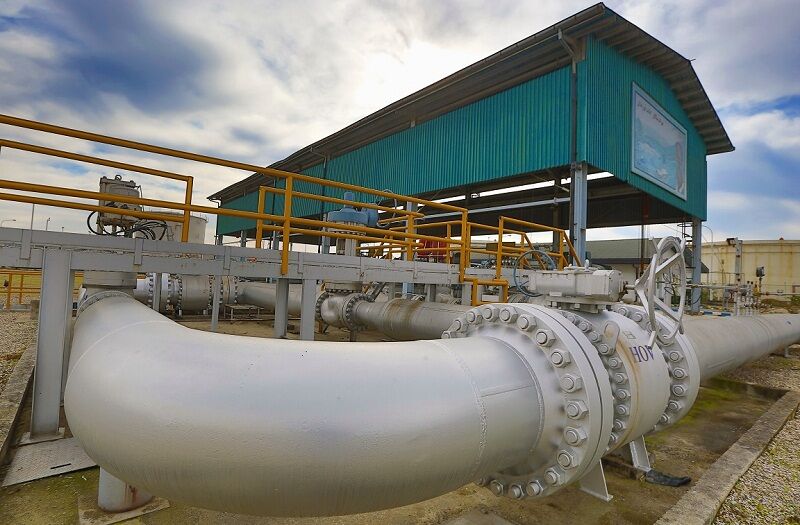Qasem Arab Yar-Mohammadi, CEO of IOPTC, said: “As its name suggests, the company has two tasks: handling pipeline and telecommunications affairs. They complement each other and they are important alike.”
He said that the primary task assigned to IOPT was to transmit crude oil, and supply feedstock to oil refineries.
“The crude oil received from National Iranian Oil Company (NIOC) or National Iranian South Oil Company (NISOC) is sent to refineries as feedstock via transmission installations (pipelines and pumping stations). In the next step, refined products, including gasoline, gasoil, fuel oil and kerosene, are carried to NIOPDC storage facilities for distribution,” he said.
Yar-Mohammadi said telecommunications was key to the transmission of petroleum fluids. Therefore, he added, the microwave, wireless and fiber optic network of IOPTC is independent.
“The safety coefficient of this section at IOPTC is 99.99%, which means minimum disruption in the telecommunications system of the company,” he said.
Yar-Mohammadi said that due to the sensitivity of job assigned to IOPTC for the transmission of crude oil and petroleum products, this company has not been privatized.
IOPTC covers 12 zones, monitoring 14,000 kilometers of pipeline and a large number of pumping stations located on various routes.
He said: “Each area is managed independently. Except for macro policy-making like specific projects requiring the approval of the Board of Directors, other affairs are decided upon independently.”
He added that all these areas were following a single objective, which is sustainable transmission of fluids via pipeline.
128bn Liters of Oil Fluid
Yar-Mohammadi said IOPTC handled the transmission of 128.59 billion liters of crude oil and petroleum products last calendar year.
“Over that period, more than 68.615 billion liters of crude oil (or 431,579,000 barrels) was carried to oil refineries while more than 49.422 billion liters of petroleum products was delivered to NIODPC storage facilities for distribution and more than 10.552 billion liters was carried to southern ports for exports,” he said.
Transmission Sustainability
Yar-Mohammadi said that preventive maintenance was key to the transmission process. He added: “Sustainability in the transmission of crude oil and petroleum products depends on overhaul, preventive maintenance, removing defects and technical monitoring.”
“Without considering the aforesaid points, no sustainability in pipeline transmission could be envisaged. Ordinary and smart pig running are monitoring tools and methods which are instrumental in the sustainable and safe transmission of fluids via pipeline,” he said.
The official noted that intelligent pig running would detect corrosion inside the pipeline.
He said a European company conducted pig running in IOPTC pipelines in 2004, adding it was similar to cardiac angiography.
He said that pigging would provide very precise information about the interior of pipelines, adding that it would help detect any obstacle to the sustainable transmission of fluids inside pipes.
Yar-Mohammadi said that despite strict pig running, pipeline transmission had been done without any halt.
He added that talks were under way for signing agreements for a 2,100-km and a 2,800-km pipeline pigging.
Yar-Mohammadi said one of the aforesaid projects would be assigned to an Iranian knowledge-based company this year. “Signing an agreement with this knowledge-based company would be a show of support for Iranian companies, as well as domestic development of this costly technology which has been monopolized by foreign companies,” he added.
Yar-Mohammadi added that nearly 5,000 kilometers of pipeline would be pigged in the current calendar year.
Reliance on Domestic Manufacturing
Yar-Mohammadi said extensive efforts were under way in Iran for the development of smart pig running technology, adding that it would not be far-reaching.
“Once, we did not have anything specific to IPTC. We largely depended on foreign companies and we had to purchase foreign tools and equipment,” he added.
The official said the conditions had changed a lot and turbines were being manufactured domestically.
Yar-Mohammadi said that in most sectors of the petroleum industry, including pipeline and telecommunications, dependence had ended.
“2MW electro-engine, pumps, electric boards and pipes are manufactured in the country. Sanctions are harmful and have had consequences, but they brought us blessings, too”, he said.
“The sanctions pressure pushed us to explore more domestic potential for manufacturing. Today, domestic manufacturing is an instruction while effective and constructive steps have been taken for domestic manufacturing,” he said.
Yar-Mohammadi said 80% of IOPTC needs was supplied domestically.
Courtesy of Iran Petroleum


Your Comment